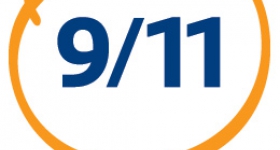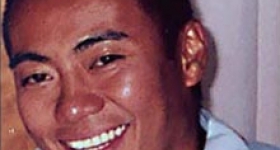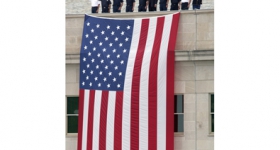The King Fahd Islamic Cultural Center, Buenos Aires, Argentina. Photo by Jack Zalium.
This week, Hyphen is publishing a series of posts in reflection on the 10th anniversary of 9/11. The series will include personal essays as well as editorials.
Saba Waheed was a graduate student in New York City during 9/11. She shares her memories of that day, her interactions with friends and fellow New Yorkers, and later, when "things that were complicated -- mosques being built -- were being collapsed into one narrative: terrorism."
--
When the first plane crashed into the World Trade Center, I was sitting in my apartment on the Upper West Side doing research online. It was the era of dial-up -- the phone line was connected to the internet, so no one could reach me. I logged off sometime just before 9am, and moments later the phone rang. Veronica was saying something about how New York was under attack and that it was World War 3. Calls from family followed, with anxious warnings … "Whatever you do, stay home." I didn’t have a television, so I wasn't seeing the circulation of the images that would haunt people's minds for months afterwards. I decided I needed to go see what was happening.
I met Veronica on the corner of 110th and Broadway, and we waited for a bus to go downtown. We saw busloads of people coming from downtown. Finally, a lone, empty bus arrived. It took us to Houston Street and then turned around. We continued down Broadway on foot, following the smoke cloud that covered the southern skies. Veronica had a tape recorder and camera; she asked me to reflect. All I could say was, I hope they weren’t Muslim.
The first time I had a feeling that being Muslim was going to be a complicated story in this country was in 1983. I was 10 years old and lying on the floor of my family's home. The news showed footage from a truck that had crashed near a Marine barrack in Beirut. I didn't have words at that time, just a deep dread that this story would not end well.
We were near Canal and Hudson when Building Number 7 fell. We were walking in its direction, and suddenly the building just went down. It was so simple and slow. One story at a time. People began to run, screaming that it was another attack. As I was about to join what was turning into a stampede, I turned and hid behind a public phone. I thought I'd be more likely to get hurt by the reaction of the crowd. Later that evening, Veronica and I stood in line to be search-and-rescue volunteers. After a few hours they sent us home, saying it was too dangerous. When we got back uptown, we found all the restaurants packed with people. No one wanted to stay home.
The next day, we decided to go back and see if we could join the search-and-rescue missions. The bus downtown was full of people wanting to go and see what was happening. This time, the bus only went to 14th St. "There's the actor from Law and Order," I pointed, "walking alongside us." The images of relatives on photocopied paper started appearing around the city. We found an image in the middle of all the faces -- a hand-drawn picture of two towers with the words: "Missing. Twins. Last seen 9/11/01."
Conversations began to get heated around New York. That thirst for revenge was coming out, even among the most progressive of folks. I felt my energy dissipate and friendships weaken. I walked out into the early morning light and saw a white truck parked outside of the building. Chalked across it were the words, "We will not forget, We will not forgive." I was transported to 1991, when I'd seen a bumper sticker on a classmate's car: "Nuke Iraq."
Later that night, Feisal and I were hanging out at the Lennox Lounge. It seemed like I was going out all the time; so were most New Yorkers. Next to us was an older man, a truck driver that had just gotten off an 18-hour driving shift. I could feel some of his hostility. You’re from there. We need to bomb there. But we talked. And Feisal, who grew up in Karachi, described how he'd seen this grow from back in the '80s, when he would watch as thousands upon thousands of Afghan refugees came through his city, living in makeshift camps, caught between the US and USSR’s Cold War. Islam turned into a third option for them. When the Cold War ended in the early '90s, I remember an L.A. Times Magazine cover that had a crescent and moon on it, and a title that read something like, "The Green Scare." That third option had now become the new kid on the block.
When the war began in Afghanistan, I went to a rally in mid-town. We were huddled together on an island in the middle of Times Square, holding up signs and chanting for peace. The responses were hostile. Five, six, seven, eight, you're a disgrace, to the United States. Or, I lost my [fill in the blank] in the World Trade Center. A couple of weeks later, a plane crashed at JFK Airport. A fireman interviewed on television said, "I don't know who did this, but I’m okay if we bomb a couple of countries in return." My college-age cousin was picked up by the FBI, because an attendant had reported him and his friends when they were praying at the gas station. One friend had been recording the group as a part of their road trip.
That morning of September 11, I was still a graduate student. I had gotten up early to do research for a grant application due later that afternoon. I was doing research on the Saudis, and how they were building mosques around the world. It was a project that had begun the summer before, when I quite randomly ended up doing fieldwork in Argentina and found a mosque. Located in Palermo -- a chic, middle-class district of Buenos Aires with residents like soccer legend Diego Maradona, covering 20,000 square meters of publicly donated land -- it was the largest mosque in all of Latin America. It cost 20 million dollars to build, and was funded by the Saudis.
It turned out that King Fahd had supported the building of Islamic Centers all over the world, including Sarajevo, East London, Gibraltar, Los Angeles, Edinburgh. It was a story of capital that flowed beyond nations. It was a question of outside forces and its impact on local communities. It transformed identity beyond national and cultural lines and along religious ones. It brought a certain hypervisibility to the community, accompanied by people's fear that it meant violence. There was so much I wanted to unpack in the story. At the same time, in the mainstream press, article after article came out trying to unpack that same story. One day, I came across a New York Times heading, "Saudis Seek to Add US Muslims to Their Sect." It resembled my thesis in facts. Except, the article began with a tone of fear and xenophobia. Watch out, they're coming into your neighborhood. Things that were complicated -- mosques being built -- were being collapsed into one narrative: terrorism.
I didn't write about the mosque again. Eventually, I left graduate school and began working downtown as a community researcher. My first project was to document the impact of 9/11 on low-income and homeless communities. Meanwhile, the resistance movements in New York continued to thrive and fight for the stories of communities to be heard. Saul Williams' "Not in Our Name" was an anthem at each of the rallies. Half a million people came out into the streets to try and stop another war from starting. The New York Taxi Workers Alliance fought FEMA because it wouldn't provide aid to taxi drivers; FEMA said they weren’t impacted by 9/11. Restaurant workers from the Top of the World Trade Center started the Restaurant Opportunities Center, and, eventually, their own restaurant. And so much more -- poets, activists, organizers staying strong and fighting a fervor of hate and war. An opportunity to reclaim our own stories. And we continue in the struggle.
Saba Waheed continues to work as a community researcher. She also produces the Los Angeles based radio show Flip the Script and is part of the editorial collective for Samar Magazine. Saba also made the short film, "When they started bombing...," a prose piece about 9/11 and the war in Afghanistan.









Comments